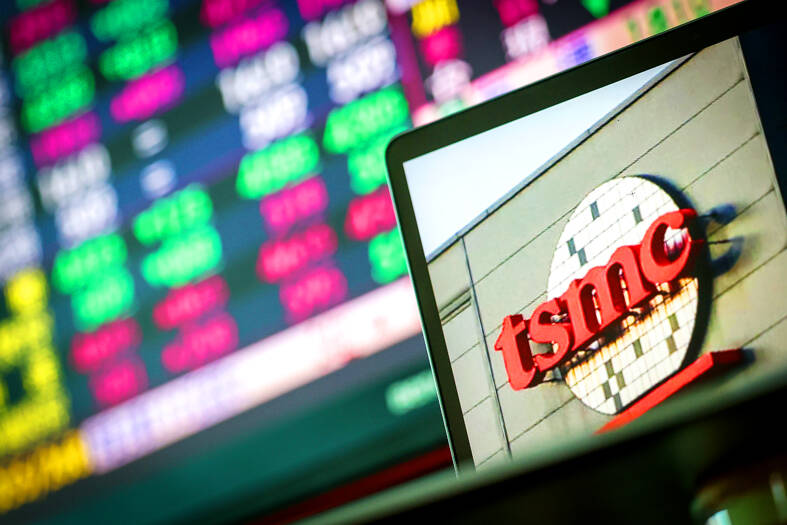The entry of chip giant Taiwan Semiconductor Manufacturing Co (TSMC, 台積電) into the elite club of the world’s most valuable companies is further proof that the generative artificial intelligence (AI) revolution is shaking up Wall Street.
TSMC, which is listed in Taipei and New York, on Monday briefly broke the US$1-trillion market capitalization barrier, putting it ahead of Tesla Inc as the seventh-most valuable technology giant on the stock market.
Also on Monday, Alphabet Inc, Apple Inc and Meta Platforms Inc hit all-time highs.

Photo: CNA
The top 10 of the world’s most valuable companies is headed by Microsoft Corp and Apple, closely followed by AI chip designer Nvidia Corp.
Their global stock market valuations exceed US$3 trillion on Wall Street.
Alphabet and Amazon.com Inc, which recently topped the US$2-trillion mark, follow in an ever-changing ranking.
Oil giant Saudi Aramco slipped into sixth place, followed by Meta, TSMC and Tesla.
“The semiconductor industry is now the leading sector in the S&P 500,” CFRA Research analyst Angelo Zino said recently. “It’s taken over the last 15 or 18 months. That shows you how much the world has changed.”
The explosion in worldwide demand for chips, boosted by the rise of computing-intensive generative AI, promises sustained expansion for the industry.
Chipmakers are not only attracting investors, but also a host of government subsidies.
US President Joe Biden’s administration, for example, has granted tens of billions of dollars in financial support over several years to help build chip factories in the US.
Worldwide sales of semiconductors, which include integrated circuits, microprocessors and memory chips, are expected to reach US$611.2 billion this year, a record for the industry, the Semiconductor Industry Association said.
Sales are expected to jump by 16 percent this year and 12.5 percent next year, the association said.
Nvidia, a designer of graphics processing units (GPUs), is the frontrunner of the craze, and has triumphed on Wall Street in recent months.
Nvidia’s GPUs are a crucial component in building generative AI and since the November 2022 launch of ChatGPT, its market capitalization has increased eightfold.
In the middle of last month, the Santa Clara, California-based group even briefly became the world’s most valuable publicly traded company, ahead of Microsoft at US$3.3 trillion.
“Nvidia’s GPU chips are the new gold or oil of the technology sector,” Wedbush Securities Inc analysts said.
For them, Nvidia, Apple and Microsoft are now engaged in “the race for the 4 trillion dollar market valuation.”
TSMC, with most of its factories based in Taiwan, is well-placed to also reap the rewards.
While Nvidia, which only designs chips, but does not manufacture them, remains discreet about its supply chain, it is widely believed that the bulk of its products are manufactured by TSMC.
The Taiwanese giant, which controls more than half of the world’s semiconductor demand, posted first-quarter sales of US$18.87 billion, up 13 percent year-on-year, while net income climbed 9 percent to US$6.97 billion.
As for Nvidia, its quarterly profit reached US$14.9 billion, a sevenfold increase over the previous year, on sales of US$26 billion.

In a small town in Paraguay, a showdown is brewing between traditional producers of yerba mate, a bitter herbal tea popular across South America, and miners of a shinier treasure: gold. A rush for the precious metal is pitting mate growers and indigenous groups against the expanding operations of small-scale miners who, until recently, were their neighbors, not nemeses. “They [the miners] have destroyed everything... The canals, springs, swamps,” said Vidal Britez, president of the Yerba Mate Producers’ Association of the town of Paso Yobai, about 210km east of capital Asuncion. “You can see the pollution from the dead fish.

SELL-OFF: Investors expect tariff-driven volatility as the local boarse reopens today, while analysts say government support and solid fundamentals would steady sentiment Local investors are bracing for a sharp market downturn today as the nation’s financial markets resume trading following a two-day closure for national holidays before the weekend, with sentiment rattled by US President Donald Trump’s sweeping tariff announcement. Trump’s unveiling of new “reciprocal tariffs” on Wednesday triggered a sell-off in global markets, with the FTSE Taiwan Index Futures — a benchmark for Taiwanese equities traded in Singapore — tumbling 9.2 percent over the past two sessions. Meanwhile, the American depositary receipts (ADRs) of Taiwan Semiconductor Manufacturing Co (TSMC, 台積電), the most heavily weighted stock on the TAIEX, plunged 13.8 percent in

A wave of stop-loss selling and panic selling hit Taiwan's stock market at its opening today, with the weighted index plunging 2,086 points — a drop of more than 9.7 percent — marking the largest intraday point and percentage loss on record. The index bottomed out at 19,212.02, while futures were locked limit-down, with more than 1,000 stocks hitting their daily drop limit. Three heavyweight stocks — Taiwan Semiconductor Manufacturing Co (TSMC, 台積電), Hon Hai Precision Industry Co (Foxconn, 鴻海精密) and MediaTek (聯發科) — hit their limit-down prices as soon as the market opened, falling to NT$848 (US$25.54), NT$138.5 and NT$1,295 respectively. TSMC's

MULTIFACETED: A task force has analyzed possible scenarios and created responses to assist domestic industries in dealing with US tariffs, the economics minister said The Executive Yuan is tomorrow to announce countermeasures to US President Donald Trump’s planned reciprocal tariffs, although the details of the plan would not be made public until Monday next week, Minister of Economic Affairs J.W. Kuo (郭智輝) said yesterday. The Cabinet established an economic and trade task force in November last year to deal with US trade and tariff related issues, Kuo told reporters outside the legislature in Taipei. The task force has been analyzing and evaluating all kinds of scenarios to identify suitable responses and determine how best to assist domestic industries in managing the effects of Trump’s tariffs, he